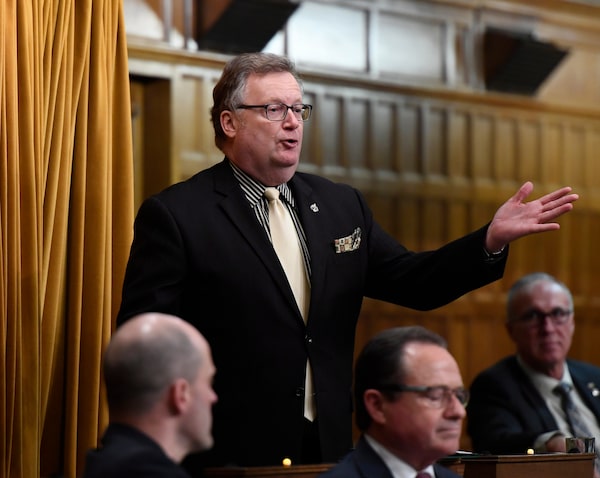
A quarter century before Saskatchewan became a province, Ottawa struck an 1880 deal with Canadian Pacific Railway Co. to build a transcontinental line across the Prairies to the newly formed province of British Columbia.Jeff McIntosh/The Canadian Press
The federal government and Saskatchewan are moving to amend the Constitution to abolish a 140-year-old political fossil that exempts Canadian Pacific Railway Ltd. from paying taxes to the province on its main line, with hundreds of millions of tax dollars at stake.
Despite that formal exemption, CP Rail has paid taxes to Saskatchewan, Alberta and Manitoba since 1966. But it is fighting in court against all three provinces, including the case against Saskatchewan in which it is seeking repayment of $341-million in provincial taxes it paid after 2002.
A quarter century before Saskatchewan became a province, Ottawa struck an 1880 deal with Canadian Pacific Railway Co. CP-T to build a transcontinental line across the Prairies to the newly formed province of British Columbia. That deal was critical in the construction of a railway to the Pacific Coast, fulfilling the promise that brought British Columbia into Confederation.
Why CP Rail’s and CN Rail’s takeover debt scares rating agencies
CP Rail fourth-quarter profit falls on rising costs, supply chain woes
The agreement contained several inducements to CP, including a clause that the company and its property related to that line “… shall be for ever free from taxation by the Dominion, or by any Province hereafter to be established.” That provision became part of the Constitution when Saskatchewan was formed in 1905; there are separate, similar provisions that apply to Alberta, and to parts of Manitoba.
The House of Commons voted unanimously on Wednesday in favour of a motion from the opposition Conservatives to amend the Constitution to eliminate that guarantee, after a unanimous vote in the Saskatchewan legislature in November. The only remaining hurdle is approval by the Senate; a vote on the measure could take place as early as Thursday.
The proposed constitutional amendment is retroactive to 1966, the year in which CP and Ottawa struck a deal for the company to voluntarily begin paying taxes in exchange for favourable changes to transportation legislation.
Hearings began in the case between CP and Saskatchewan in early November, and later that month, the provincial legislature gave its unanimous support for a constitutional amendment.Todd Korol/Reuters
Saskatchewan Justice Minister Gordon Wyant said the change would remedy an “inherent unfairness” that exempts CP Rail from taxes in some parts of the country, but not others. “We think that Saskatchewan should be treated as an equal partner in Confederation when it comes to taxation policy, especially when it comes to large national corporations like Canadian Pacific Railway,” he said.
The rapid progress of the constitutional amendment comes after 13 years of legal wrangling between CP Rail, Ottawa and the three Prairie provinces. In a statement, CP said it launched those legal efforts after a 2007 Supreme Court of Canada ruling that taxpayers could seek repayment of taxes found to be unconstitutional.
“CP has a valid legal right to uphold the bargain that was struck, and is now asking the courts to ensure that the governments honour their commitments,” the company’s statement said.
Reacting to the Commons vote, the company later said it will “carefully review any action taken concerning the tax exemption for business conducted on CP’s historic main line.”
The company added that it is willing to consider other remedies, such as tax credits and investments in infrastructure.

Conservative MP Kevin Waugh speaks in the House of Commons on Parliament Hill in Ottawa on May 4, 2018. Mr. Waugh, who is chair of the party’s Saskatchewan caucus, said he believes a constitutional amendment will extinguish CP’s lawsuit.Justin Tang/The Canadian Press
In September, CP lost its case against Ottawa in Federal Court, where it was seeking exemption from federal taxes along its main line. However, the company said in its statement that the September decision found that the tax exemption “had constitutional force at the provincial level.” If Saskatchewan courts came to the same conclusion, CP said, the company would be covered by the original exemption and have the right to seek repayment of provincial taxes.
Hearings began in the case between CP and Saskatchewan in early November, and later that month, the provincial legislature gave its unanimous support for a constitutional amendment. Mr. Wyant said the decision to push for an amendment was unrelated to the September court decision.
Federal Conservative MP Kevin Waugh, chair of the party’s Saskatchewan caucus, said he believes the amendment will extinguish CP’s lawsuit.
However, Mr. Wyant said that is a matter that his department’s lawyers will need to study. “It doesn’t automatically extinguish anything,” he said.
John Whyte, a constitutional lawyer and a professor emeritus at the University of Regina, said there is no constitutional prohibition on retroactive measures. He said any court would take issues of fairness into account, making it possible that CP’s lawsuit might still proceed. But Prof. Whyte said that he believes, on balance, that such a retroactive measure would succeed.
Tax and Spend examines the intricacies and oddities of taxation and government spending.
Sign up for the Tax and Spend newsletter.
 Patrick Brethour
Patrick Brethour